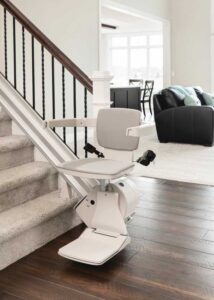Blog
What to Know About Getting a Stair Lift for Your Loved One
 Caregivers often find themselves navigating the complexities of ensuring their loved ones continue to maintain their independence and safety at home, especially when mobility issues arise. One significant aspect to consider is how they can safely access different levels of their home. Stair lifts can be invaluable in helping those with mobility challenges overcome the hurdles posed by staircases. Read on to learn about this vital assistive technology and how it can enhance the quality of life for your loved one.
Caregivers often find themselves navigating the complexities of ensuring their loved ones continue to maintain their independence and safety at home, especially when mobility issues arise. One significant aspect to consider is how they can safely access different levels of their home. Stair lifts can be invaluable in helping those with mobility challenges overcome the hurdles posed by staircases. Read on to learn about this vital assistive technology and how it can enhance the quality of life for your loved one.
Understanding Stair Lifts
A stair lift is a mechanical device that allows individuals with mobility limitations to travel up and down staircases safely and comfortably. By installing a stair lift, you can alleviate the risks associated with climbing stairs, thus providing your loved one with increased freedom to move throughout their home. These devices can be installed on both straight and curved staircases and come in various styles and options, ensuring that they can fit into most home environments without compromising aesthetics.
When considering a stair lift, it’s essential to evaluate the stairway’s layout, the user’s specific needs, and the overall accessibility of the home. Engaging with a professional to assess your home can help identify the best solutions tailored to your loved one’s unique requirements. Your medical product supplier can also offer guidance on the latest models and features, ensuring you choose the ideal stair lift for optimal comfort and safety.
The Importance of Safety Features
Safety is paramount when choosing a stair lift for your loved one. Many modern stair lifts come equipped with essential safety features such as seat belts, obstruction sensors, and automatic braking systems. These functions are designed to protect users from accidents while using the lift. Additionally, it’s crucial to ensure that the lift has undergone rigorous safety testing and complies with relevant regulations and standards.
Before finalizing your purchase, consider reviewing the safety features in person and asking questions about the operation and emergency procedures of the stair lift. This information will ease your mind and equip your loved one with the knowledge they need to use the device confidently and safely.
Installation and Maintenance
Installing a stair lift typically requires the expertise of a qualified technician. The installation process is generally quick and usually completed within a few hours, depending on the complexity of the staircase. It is advisable to work closely with your medical product supplier, as they can provide professional installation services to guarantee a streamlined and secure setup.
Once installed, maintenance of the stair lift is essential to ensure its long-term functionality. Regular check-ups and maintenance services should be part of your agreement with your supplier. Many companies offer service packages that include routine inspections, servicing, and necessary repairs. This enables you to keep the stair lift in optimal working condition and provides peace of mind that it will reliably support your loved one as they navigate their home.
Financial Considerations
The cost of acquiring a stair lift can be a concern for many caregivers. While initial expenses may seem substantial, it’s essential to view this as an investment in your loved one’s independence and well-being.
Furthermore, consider the long-term advantages of a stair lift. By enabling your loved one to remain in their home and maintain a higher level of independence, you may prevent additional expenses related to assisted living facilities or in-home care services.
Choosing the right stair lift for your loved one with mobility issues can significantly impact their quality of life, allowing them to maintain independence and safety in their home. By doing so, you are enhancing their mobility and enriching their daily life with greater freedom and comfort.
For more information about stair lifts, contact us at Corner Home Medical.
